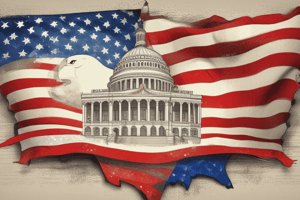Podcast
Questions and Answers
How can teachers help students deepen their understanding of the Constitution?
How can teachers help students deepen their understanding of the Constitution?
- Through Generation Citizen's Civics Day competitions (correct)
- By organizing a math competition
- By hosting a science fair
- Through virtual reality tours of famous landmarks
What challenge does the digital age pose to the Constitution's fundamental principles?
What challenge does the digital age pose to the Constitution's fundamental principles?
- A decrease in civic engagement
- Increased access to reliable information
- The rapid spread of fake news and disinformation (correct)
- Enhanced media literacy skills
Why is it important for students to be active participants in a democratic society?
Why is it important for students to be active participants in a democratic society?
- To learn how to play musical instruments
- To engage in civil discourse and civic action (correct)
- To become professional athletes
- To develop skills in math
What role does party and corporate power play in shaping Republicanism and the Constitution's principles?
What role does party and corporate power play in shaping Republicanism and the Constitution's principles?
How does the Constitution continue to guide our democracy today?
How does the Constitution continue to guide our democracy today?
Which resource is mentioned to help emphasize media literacy and news consumption?
Which resource is mentioned to help emphasize media literacy and news consumption?
What is the primary purpose of the Constitution's separation of powers?
What is the primary purpose of the Constitution's separation of powers?
How does Federalism impact the distribution of power in the U.S. government?
How does Federalism impact the distribution of power in the U.S. government?
Which section of the Constitution addresses individual rights and freedoms?
Which section of the Constitution addresses individual rights and freedoms?
Why can the Constitution be considered a 'living, breathing document'?
Why can the Constitution be considered a 'living, breathing document'?
What was a key motivation behind drafting the Constitution in 1787?
What was a key motivation behind drafting the Constitution in 1787?
How can civic engagement be promoted through education about the Constitution?
How can civic engagement be promoted through education about the Constitution?
Flashcards are hidden until you start studying
Study Notes
Understanding the Constitution: Foundations of American Democracy
The Constitution, a cornerstone of American democracy, has underpinned our nation's system of government for over two centuries. It's a living, breathing document, ever-evolving to meet the needs of a changing society. To educate students on the Constitution's principles, it's crucial to develop critical thinking and debate skills, as well as promote civic engagement.
Origins and Principles
The Constitution was drafted in 1787 to establish a central government with a structural separation of powers among three branches—executive, legislative, and judicial. It aimed to prevent the rise of a tyrannical leader, guarantee individual liberties, and protect the rights of the minority against the will of the majority.
Key Features
- Separation of Powers: The Constitution outlines the interdependent yet independent branches of government, ensuring checks and balances.
- Federalism: The Constitution establishes a federal system of government, in which power is shared between the national and state governments.
- Bill of Rights: The first ten amendments to the Constitution guarantee individual rights and liberties, such as freedom of speech and religion.
- Amendments: The Constitution can be amended through a well-defined process to adapt to changing social and political needs.
Engaging Students
Teachers can integrate authentic civics projects to help students engage with the Constitution and its principles. For example, Generation Citizen's Civics Day competitions or We the People's mock congressional hearings can help students deepen their understanding of the Constitution and its practical application.
Modern Challenges
In our digital age, fake news and disinformation spread rapidly, often challenging the Constitution's fundamental principles. Teachers should emphasize the importance of media literacy and news consumption, utilizing resources like the Stanford History Education Group's Civic Online Reasoning program and Checkology.
Civic Engagement
Today's students must be active participants in a democratic society, developing the skills to engage in civil discourse and civic action. They need to be aware of the Constitution's provisions and their role in upholding them. Republicanism and the Constitution's principles would have unfolded differently without the influence of party and corporate power.
Conclusion
The Constitution is a fundamental document that has shaped our nation's history, and it continues to guide our democracy today. By promoting civic engagement, critical thinking, and debate skills, educators can empower students to become informed and active citizens.
Studying That Suits You
Use AI to generate personalized quizzes and flashcards to suit your learning preferences.




